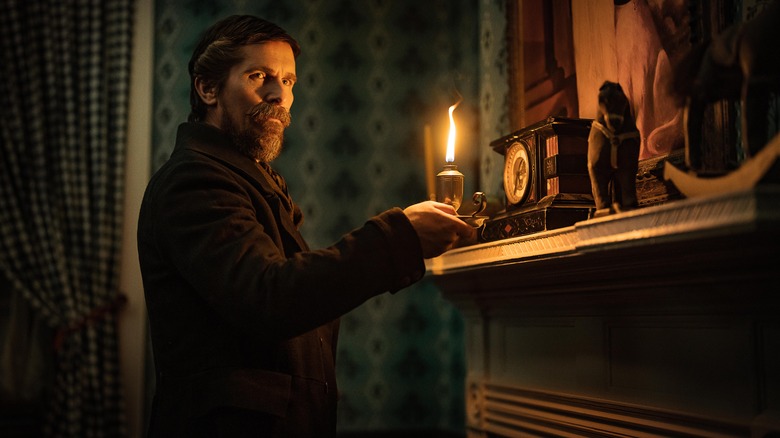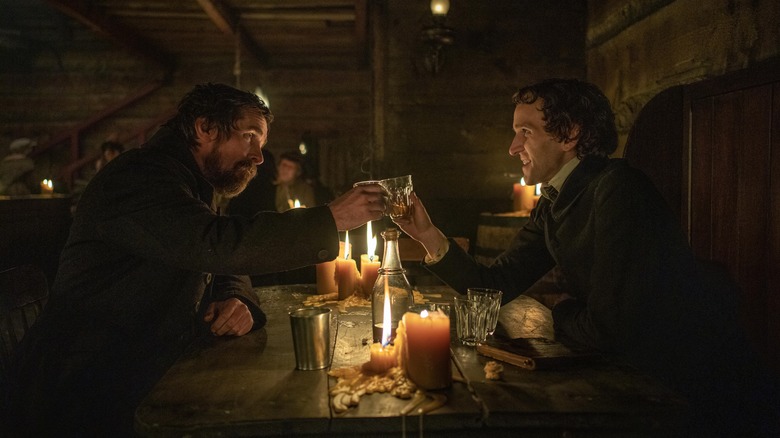The Pale Blue Eye Review: Christian Bale Teams Up With Edgar Allan Poe To Solve A Mystery
What if Edgar Allan Poe, the man who created the detective fiction genre, had to solve a mystery in real life? That's a premise that's been used several times over — the quite bad film "The Raven," which had a miscast John Cusack as Poe, crafts its story around Poe trying to catch a killer using his stories for inspiration, and the novel "Nevermore" has Poe team up with Davy Crockett (!) to solve a whodunit. And now we have "The Pale Blue Eye," Scott Cooper's midnight dreary mystery in which West Point Academy cadet Poe (a well-cast, pitch-perfect Harry Melling) teams up with a renowned detective to solve a murder mystery.
That detective is Augustus Landor, played by Christian Bale with just the right amount of haunted brooding. It's a cold, snowy winter at West Point, and a cadet has just been found dead, hanging from a tree. What first appears to be a suicide turns into murder when it's revealed the dead man's heart has been cut out. It's an appropriately ghoulish scenario and Poe, little weirdo that he is, can't help but get involved. Melling plays the poet and writer as a verbose blowhard, and while that could've easily backfired and turned Poe into someone insufferable, the actor finds just the right note to make Poe kind of lovable. He's not at all the hard-drinking morose gothic ghoul that we've come to think of him as, but rather a scrappy, nerdy guy who gets swept up in the thrill of the hunt.
Meanwhile, Bale's detective keeps uncovering new angles to the murder, hinting at a bigger conspiracy and the threat of a serial killer lurking around West Point. Everyone is a suspect, be it a local doctor (Toby Jones, who can play this sort of role in his sleep at this point) and his wife (Gillian Anderson, having a ball with a smallish part), and on and on. There's no shortage of suspects for Bale to leer at, eyebrow raised, suspicions piqued.
Only this and nothing more
The friendship that develops between the detective and the poet is one of the more enjoyable elements of "The Pale Blue Eye." Rather than begrudge or grumble about his new partner, Augustus takes a shine to Poe, and the two of them play off each other exceedingly well. Indeed, Bale and Melling work so well here that I wish they would make another Augustus/Poe mystery together — one that actually succeeds where this one fails.
The mystery is never as enticing as it should be. In fact, it's the least interesting thing about the film. Cooper is far more interested in little character moments, like when Poe woos the doctor's daughter (Lucy Boynton), with the two of them going on a date (of sorts) in a snowy graveyard. At the same time, certain characters get the shaft. Charlotte Gainsbourg is utterly wasted as a local who falls into a blink-and-you'll-miss-it tryst with Bale's character, and Robert Duvall feels underused as an expert on the occult. You get the sense that some of his scenes ended up on the cutting room floor, because Augustus introduces Duvall's character as the "strangest man he's ever met," and yet when we meet Duvall's character he's perfectly normal.
As frustrating as all of this is, Bale and Melling keep things interesting. Bale is particularly good at playing the inner turmoil of his character, and Melling absolutely nails the melancholy lurking beneath Poe's verbose exterior. When Poe has a tearful conversation with Augustus late in the film it's downright heartbreaking — we can feel the deep sadness radiating from this troubled, tortured poet. Poe continues to thrill and haunt us to this day, and Melling manages to reach back through time and find the human being lurking beneath all the lore.
Which is why it's a pity that "The Pale Blue Eye" never quite adds up. There are snapshots of something greater here; hints of a grander mystery, a bigger twist, a better climax. Alas, we can only ponder, weak and weary, over what that better film could have been.
/Film Rating: 6 out of 10

